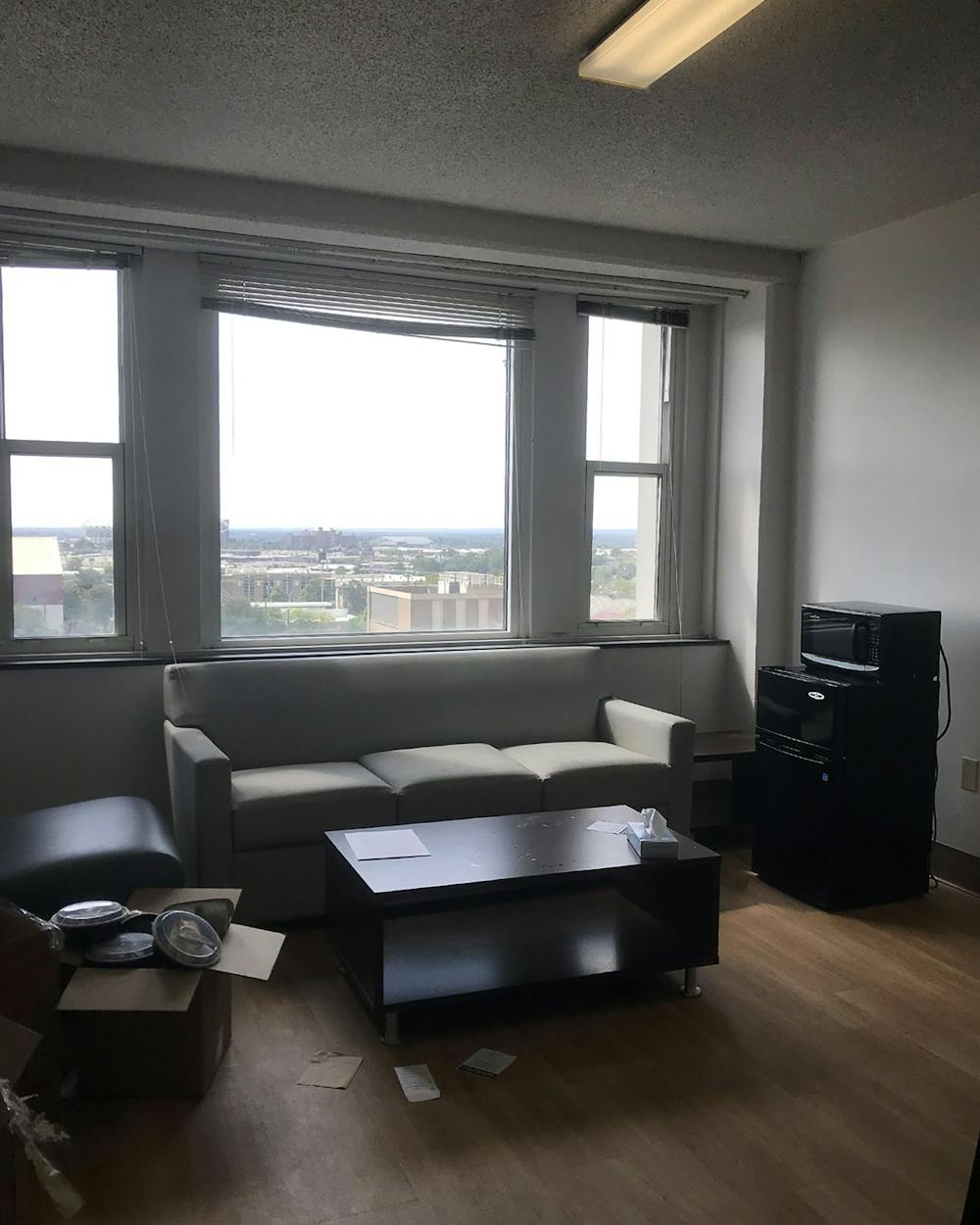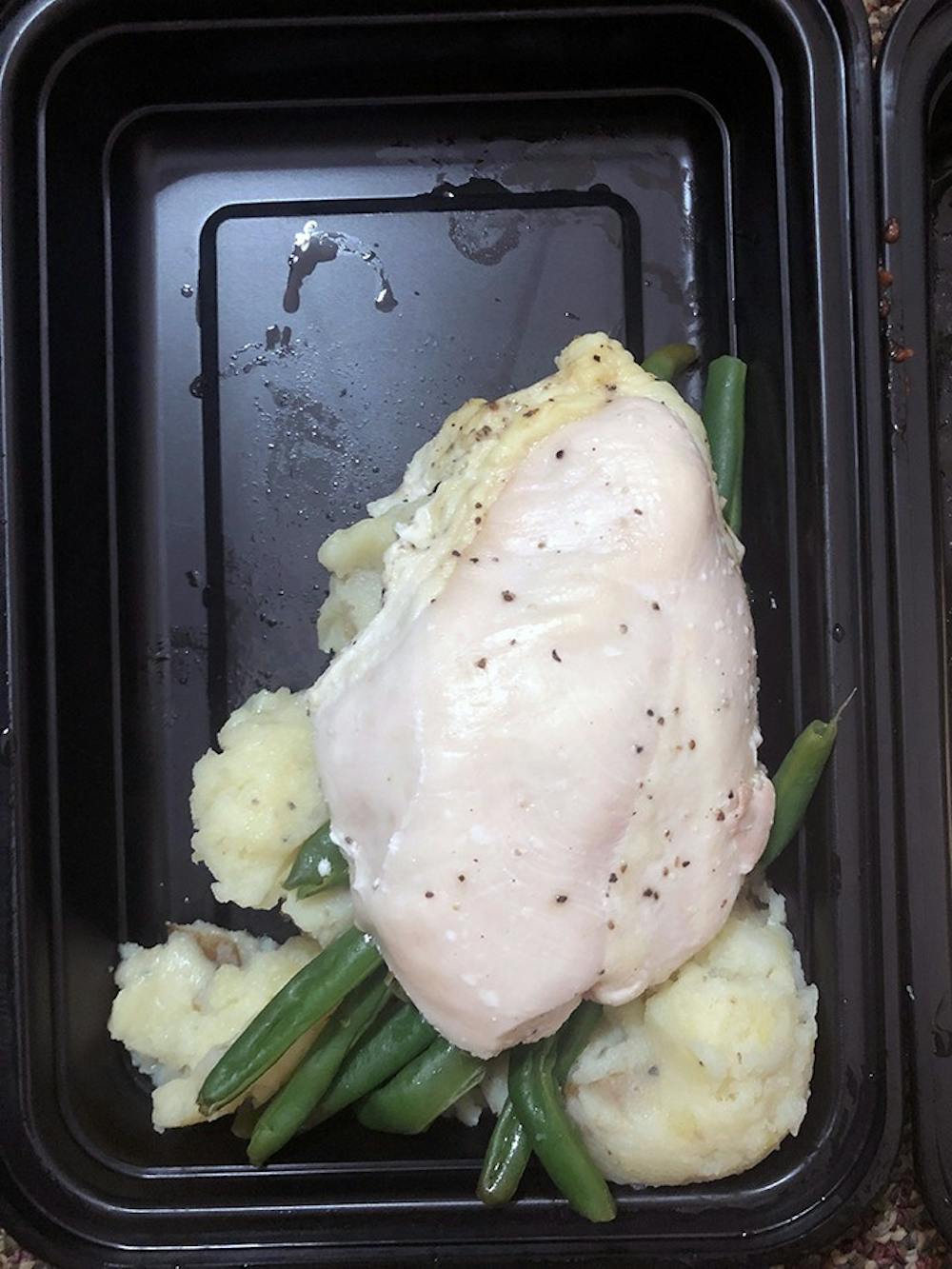First-year business student Lizzie Pyne found out her friend tested positive for the coronavirus on Sept. 2. She received a call from the university about it that Thursday, Sept. 3.
Then, on the morning of Sept. 4, Pyne's luggage was picked up by a bus, and she walked over to the National Advocacy Center (NAC) from South Quad, as she had been in contact with her positive friend.

The NAC and Bates West buildings currently have 278 spaces filled. In these buildings are quarantining students, who have come into contact with a person with the coronavirus, and isolating students, who have the coronavirus themselves. While quarantining and isolating individuals might share the same building, they do not share rooms.
Pyne stayed in a small room with a bed that took up most of the space, she said.
"The room is basically just all bed. There's a bed and a desk and then one chair that I don't really sit in. But it's a pretty small room," Pyne said. "Ten whole days is a long time to be in a small room."
A first-year undeclared student, who wished to remain anonymous, located in the Bates West dorms said the building was "old-looking, kind of outdated."
The student stayed in a dorm with a kitchen area, two bedrooms with two beds each, a living room area and a bathroom with two other roommates.
When a first-year marketing student, who also wished to remain anonymous, arrived at Bates West, the hot water wasn't working.
"We called maintenance a few times, but no one really answered," they said. "It took about two days from the first time I called maintenance for the water to get fixed."
Classes didn't stop for Pyne while she stayed in the NAC, and she still had to attend classes online, she said.
"The Wi-Fi was on and off. I had to use my phone hotspot a lot of the time because the Wi-Fi wasn't really working too well," Pyne said.
Another first-year undeclared student, who wished to remain anonymous, found themselves in the same situation at the NAC, having to use their phone's hotspot as the internet became unreliable. While they also had an in-person class, they said the class offered an online format to join.
While Pyne stayed at the NAC, the university didn't make any calls or check in on her, Pyne said.
"I've called with a few questions, and it's usually pretty hard to get someone to answer. I mean, I know they're really busy, but it is pretty hard to get someone on the phone to talk to that knows what they're talking about," Pyne said. "A lot of people said different things about the policies for deliveries and stuff, you get a lot of mixed information, so yeah, that part's pretty hard."
The marketing student in Bates West said they also received no check-in calls from the university during their time there. They were told they'd be given surveys by nurses who reached out to them, but that didn't happen until their sixth day in quarantine.
However, a second-year business management and marketing student in Bates West, who wished to remain anonymous, said they got multiple calls from the university checking in on them.
"First day; many, many calls and people checking in. And then every other day I've gotten a phone call saying, 'Hey, do you need food? How are you feeling?' and contact tracing contacted me," they said.
While the undeclared student in Bates West also got daily check-up calls, the food was a different story.
"Most of it looks really gross. Like today we got a chicken thing, and the chicken is just soggy, and I also don't really know how long it's been sitting out there because it varies what time we get the food sometimes," they said.

The marketing student in Bates West wasn't just upset about what food they and their roommates received, but also how they got it. They had received only two meals for three people in their room and had to get their mother to call the university about it.
"Then the food that they did bring us, my roommate who was in there with us has an allergy to fish and shellfish, and they brought a box that has fish and shellfish in it," they said. "She told them that she had an allergy, too, and so she didn't eat it, but if her allergy was bad enough where she touched something else that had it on it, that could've been really bad."
When it came time to leave, the undeclared student in the NAC said they got a call to schedule a time for a bus to pick them up and had to give the people manning the NAC their room number and key. They received a mandatory survey every morning during quarantine through MyHealthSpace, which asked if they had any symptoms. According to them, you needed to do only one to leave. They weren't tested.
Pyne also received these surveys through MyHealthSpace and wasn't tested before she left.
According to university spokesperson Jeff Stensland, the CDC doesn't recommend retesting, and the university instead sends out the surveys.
The marketing student said quarantine "was not fun at all."
"It was more of a hassle trying to get in contact with people and getting things to go smoothly with the food and everything. Besides the fact that actual quarantine was just boring, it was just kind of depressing in there, everything was very sterile and it seemed like you were kind of on your own," they said.
The Daily Gamecock reached out to housing on Aug. 19 and Sept. 7 and Student Health Services on Aug. 19 but did not receive comment.

